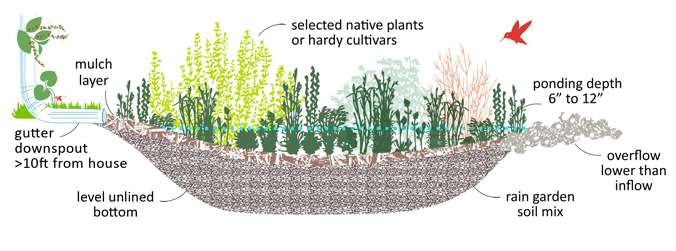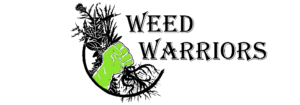Wrap-up fo the Garden for Wildlife project in 2020
Project Name: Garden 4 Wildlife
Date: June 2020 – June 2021, extended to Sept 31, 2021.
On-line Workshops in the Garden for Wildlife Program - Learn how sustainable gardening techniques benefit both people and wildlife.
Adding native plants and perennial flowering plants to a community garden, a public park, or your home garden contributes a greater impact to the overall health of wildlife around Puget Sound. Gardens for Wildlife program addresses the need for wildlife habitat through a combination of education and stewardship activities. The knowledge gained trough the Zoom workshops and a restoration event in a community park or community garden enables participants to successfully garden for wildlife in their own yard, garden, or apartment balcony. The events and Zoom workshops were free and open to the public.
"Garden for Wildlife" Zoom workshops topics included:
1. Identify and control invasive non-native weeds. We hosted 10 events during the summer of 2020, including three Zoom workshops on Invasive Weeds, how to control them and restore a garden, yard, or area to a wildlife friendly habitat. We also hosted a Graduation Ceremony in the summer of 2020 for the members of this program.
2. Composting, mulching was delivered in January of 2021. This program was currently running with a Zoom instructional workshop and hands-on practice in composting techniques at the New Start Community Garden in Burien, WA.
3. A Wetlands workshop was delivered in February 2021 on various types, the importance of wetlands as habitat for wildlife. This class was delivered via Zoom with Instructor Lauryn Duoto, WHIT Wetland Certification. Attendees were invited to participate in a wetland restoration project the same week.
4. Sustainable Gardening Practices with Taryn Koerker was scheduled and took place via Zoom on April 11th, 2021.
5. Recipients of the booklet, "Garden 4 Wildife" learned of alternative garden favorites in place of noxious weeds. A Garden 4 Wildlife "Zine" coloring book, suitable for all ages, featuring native plants, garden favorites, and facts about noxious weeds, was created by local artist and gardener Amber Raven Nichol of Normandy Park and printed and distributed with water color paints and/or crayons in the summer of 2021, at the Burien Farmer's Market, the New Start Community Garden "Art in the Garden Celebration, and at other environmental outdoor events.
Components of this program were funded by a grant from the Port of Seattle Airport Community Ecology (ACE) fund, and produced in partnership with National Wildlife Federation, New Start Community Garden in the Highline School District, also called the "Shark Garden" after the school mascot, City of Burien, students from all around Puget Sound and volunteers like you.
- Please summarize, in a few sentences, the goals of your project and what you were able to accomplish with funding from the Port of Seattle ACE Grant.
We were able to accomplish our Garden for Wildlife project. Since our Garden for Wildlife classes were held either by Zoom, or safely in person at the New Start Community Garden with attendees wearing masks and social distancing, we had no delivery problems. We also hosted many garden events with small groups that weeded the community garden areas, mulched weeded areas with wood chips for weed suppression, and revitalized areas with garden friendly and native plants. All events complied with local Covid guidelines for small outdoor groups. The Zoom compost workshop was followed by an on-site, hands-on event at the New Start Community Garden. Attendees created weed-free compost that was later used as soil in a new section of a garden “favorite plants area” created by the New Start Summer School attendees.
We hosted 3 Zoom workshop classes on topics supporting environmental stewardship and were essential in creating wildlife friendly gardens. These workshops included: Composting, Identifying and Controlling Invasive Noxious Weeds, and Sustainable Garden Practices, which was the most popular. The 4th deliverable was creating a unique all-ages coloring book called a Zine, which is discussed in #2. The Port of Seattle and our project partners logos were printed on the Zine for recognition and advertising the project.
- Please describe any challenges you faced in implementing your project and how you worked to overcome them.
The only challenge was offering a unique Zoom class on Native Edible Plants. By the time we were to host the last public Zoom class, we realized that other local environmental non-profits, including the University of WA, were advertising similar classes on Native Edible Plants, so we changed our focus to producing a “Zine,” a small “magazine,” as the 4th deliverable. This was approved and the extension granted. The Zine, created by a local artist and Garden for Wildlife enthusiast, was popular and was distributed freely, with color crayons or colored pencils, to volunteers and to community members at the Burien Farmer’s Market and garden events.
When we originally planned the project, we had hoped for participation with students from the schools. However, the Highline School District did not allow the students into the garden area during the regular school year, due to the District’s Covid restrictions. Also, in the beginning of the pandemic, the Burien City Parks were closed to activities, but we were able to continue in the garden, since it was tied to agriculture production (we raise and donate food for the local food bank) and were allowed to host activities, with social distancing restrictions, according to WA state guidelines. We had a good turn-out of adult volunteers that stepped-up to volunteer at the garden and participate in the project. Only during the New Start summer school, a few students were able to participate in the garden where they helped create and plant a new garden common area using the weed free compost.
- How has the COVID-19 crisis has impacted your ability to implement project deliverables? Have you requested a scope and budget modification from the Port?
We requested a modification to the project for the 4th Zoom class and changed it to the Zine coloring book. By the time the coloring book was printed, we were able to pass out materials at the Burien Farmer’s Market and the garden. In the beginning of the Covid season, we could not hand people paper items, but luckily this changed during the summer months.
- Please describe any lessons learned from working with diverse partners or audiences on your project. Be specific and give an example of how a new or different perspective impacted your project or your approach.
The major adjustment was changing focus to comply with the Covid restrictions. We learned the best plans can change due to outside factors, like Covid-19. We transitioned to Zoom for meetings and classes, which we probably would have not so readily embraced, had it not been for Covid-19, since we previously hosted classes at the Burien Community Center.
- Were you able to meet the 3:1 match? Please describe your experience in meeting and documenting this requirement.
Yes, we were able to meet the required match. We had no problem meeting this requirement since we have a lot of volunteers that could work outdoors and social distance safely at our project events.
The match excel worksheet gives details, but here are the totals for each category:
| Total Match of all Categories for the Garden for Wildlife Project | |
| Independent Sector Monetary Value for Volunteer Hours | |
| Volunteer Hours | $66,544.52 |
| Attendees at Events | $12,107.20 |
| Planning and Contact Hours | $5,203.57 |
| In-Kind - Non-Affiliated | $320.00 |
| In-Kind Affiliated | $3,210.50 |
| $87,385.78 | |
Thank you to the Port staff for allowing us to be flexible and for understanding the Covid impacts on delivering a project in the midst of a deadly pandemic. We are grateful.
Check out the National Wildlife Federation’s Garden for Wildlife program for attracting Birds, Butterflies and Other a Backyard Wildlife to your yard or apartment balcony. Many communities around Puget Sound are a registered Community Wildlife Habitat communities that have schoolyard wildlife habitats, native plants gardens, and other features that count toward city certification as a Wildlife Habitat Community. The New Start Community Garden at the New Start High School in Burien, is a certified Schoolyard Wildlife Habitat. Burien, among other cities, are working toward full certification with the National Wildlife Federation. Please consider registering your yard or balcony, as this helps your city become a Wildlife Habitat Community.

